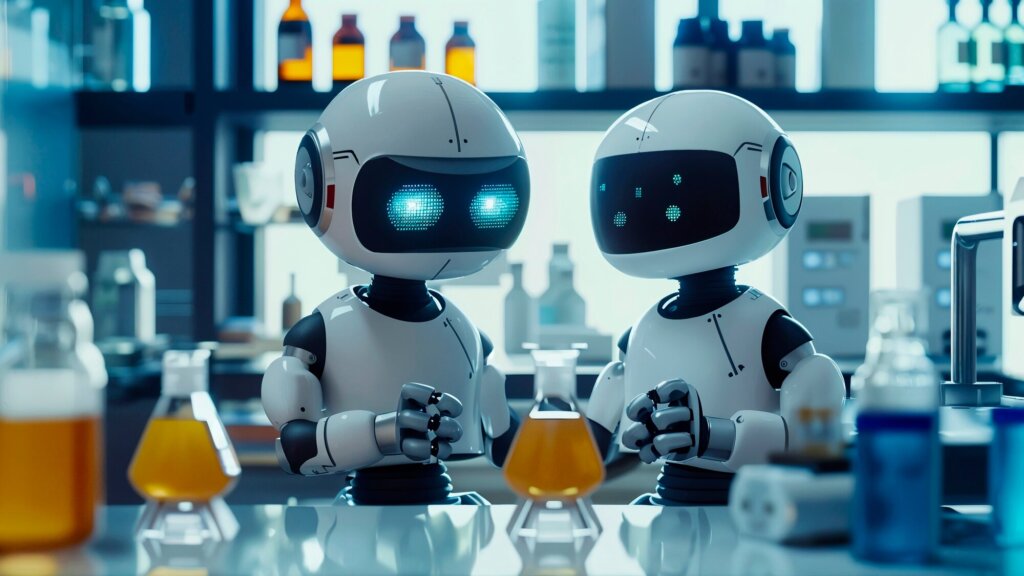Artificial Intelligence (AI) is changing how we use technology every day. At the center of this change are AI agents, which are programs designed to do tasks, solve problems, and learn from data. But what are AI agents really? Let’s break it down and learn more about what they are, how they work, and why they matter.
Table of Contents
What Are AI Agents?
An AI agent is a software program that uses artificial intelligence to see what’s happening around it, make decisions, and take action to reach a goal. Simply put, AI agents are systems that can think, learn, and act on their own. Whether it’s suggesting a movie, finding the fastest delivery route, or helping businesses run smoothly, AI agents are super useful.
AI agents work by collecting information, analyzing it, and deciding what to do based on their programming. This lets them make smart decisions, often better and faster than humans can.
AI Agents Definition
An AI agent is formally defined as: “A system that can see its environment through sensors and act on it using tools to reach a specific goal.” In short, AI agents turn data into smart actions.
Types of AI Agents
There are different types of AI agents, each made for a specific job. Here are the main types:
1. Reactive Agents
Reactive agents are the simplest kind. They only react to what’s happening now and don’t have memory or learning abilities. For example, a thermostat adjusts the temperature based on the current room temperature.
2. Model-Based Agents
Model-based agents have a mental map of their environment. This lets them plan actions and adapt to changes. For example, they can figure out the best way to complete a task based on what they know.
3. Goal-Based Agents
Goal-based agents aim to achieve specific goals. They look at different actions and choose the one that helps them succeed. For example, self-driving cars use goal-based agents to safely navigate to a destination.
4. Utility-Based Agents
Utility-based agents pick actions that give the best result. For example, e-commerce websites use these agents to recommend products that shoppers will like the most.
5. Learning Agents
Learning agents are the most advanced type. They use machine learning to improve over time. Virtual assistants like Siri or Alexa learn from user interactions to give better answers.

How Do AI Agents Work?
AI agents work through four main steps:
1. Perception
AI agents collect information using sensors. This could be a camera, a microphone, or even online data.
2. Decision-Making
Once the agent has data, it processes it using algorithms. It then decides the best action to take based on this information.
3. Action
After deciding, the agent performs an action. This might be answering a question, moving a robot, or making a suggestion.
4. Learning
Some AI agents learn from what they do and get better over time. This learning is powered by machine learning.
What Are AI Agents Used For?
AI agents are used in almost every industry. Here are a few examples:
1. Healthcare
AI agents help doctors diagnose diseases, recommend treatments, and manage patient records. For example, IBM’s Watson Health suggests treatment plans based on medical data.
2. Finance
In finance, AI agents detect fraud, trade stocks, and help customers. Robo-advisors guide people in managing their investments.
3. Customer Service
Chatbots powered by AI agents provide instant answers to customer questions, making customer support faster and more efficient.
4. Transportation
AI agents power self-driving cars and help find the fastest routes. Companies like Tesla use AI agents to improve driving safety.
5. E-Commerce
AI agents recommend products, manage inventory, and optimize shipping. For example, Amazon’s product suggestions come from AI agents.
Why Are AI Agents Useful?
AI agents offer many benefits that make them valuable:
1. Efficiency
AI agents can handle repetitive tasks faster and more accurately than humans.
2. Cost Savings
By automating tasks, businesses can save money and let workers focus on more important jobs.
3. Scalability
AI agents can handle large amounts of work, making them perfect for growing businesses.
4. Personalization
AI agents create personalized experiences, like recommending movies or customizing healthcare solutions.
5. Learning Over Time
Learning agents get better and smarter with each interaction.
Challenges of AI Agents
Even though AI agents are amazing, they also come with some challenges:
1. Data Needs
AI agents need a lot of data to work well. If the data is limited or biased, they won’t perform as expected.
2. Complexity
Building and managing AI agents is not easy and requires skilled experts.
3. Ethical Concerns
AI agents raise questions about privacy, fairness, and how their decisions are made.
4. Integration
Adding AI agents to existing systems can be expensive and time-consuming.
What’s Next for AI Agents?
The future of AI agents is exciting! Here are some trends to look out for:
1. Better Personalization
AI agents will get even better at customizing experiences for each user.
2. Working With Humans
AI agents will work alongside people, helping them be more productive and creative.
3. More Autonomy
Future AI agents will need less human input and make smarter decisions on their own.
Conclusion
AI agents are a key part of modern technology. They are systems that can see, decide, and act to achieve goals. From helping with daily tasks to transforming entire industries, AI agents are making life easier and more efficient.
Understanding what are AI agents is important as we move further into the digital age. With their ability to learn, adapt, and grow, AI agents will continue to shape the future in exciting ways.


